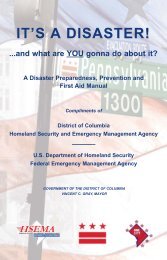- Page 2 and 3:
MESSAGE FROMTHE DIRECTORDear Reside
- Page 4 and 5:
EVACUATIONThe District Department o
- Page 6:
The mission of the Technical Servic
- Page 10 and 11:
DISTRICT EMERGENCY SHELTERS (CONTIN
- Page 12 and 13:
DISTRICT OF COLUMBIA PUBLIC SCHOOLS
- Page 14 and 15:
IT’SADISASTER!…and what are YOU
- Page 16 and 17:
DEDICATIONThis manual is dedicated
- Page 19 and 20:
Winter Storm & Extreme Cold Mitigat
- Page 21 and 22:
Section 3 - Information & Tips on B
- Page 23 and 24:
Financial Assistance Programs . . .
- Page 25 and 26:
GENERAL FACTS & FIGURES ON DISASTER
- Page 27 and 28:
More than 90% of declared disasters
- Page 29 and 30:
A tsunami is NOT a tidal wave — i
- Page 31 and 32:
FAMILY EMERGENCY PLAN CHECKLISTThe
- Page 33 and 34:
TIPS FOR ELDERLY & DISABLED FAMILY
- Page 35 and 36:
FAMILY EMERGENCY PLANEMERGENCY CONT
- Page 37 and 38:
DISASTER SUPPLIES KITDisasters happ
- Page 39 and 40:
There are many different sizes of F
- Page 41 and 42:
[ ] Aluminum foil and resealable pl
- Page 43 and 44:
[ ] Blankets or sleeping bags (smal
- Page 45 and 46:
[ ] Personal hygiene items (hand sa
- Page 47 and 48:
THINK ABOUT SHELTERSheltering may t
- Page 49 and 50:
WHAT TO DO BEFORE ADISASTER STRIKES
- Page 51 and 52:
• Secure heavy appliances like wa
- Page 53 and 54:
Find the right size for your home o
- Page 55 and 56:
and winter storms include damaging
- Page 57 and 58:
actually due to “ice dams”. Ice
- Page 59 and 60:
WHO RESPONDS DURING A DISASTER OREM
- Page 61 and 62:
Know your colors - Learn the Avalan
- Page 63 and 64:
Another major factor is the world
- Page 65 and 66:
What are YOU gonna do about…CIVIL
- Page 67 and 68:
eginning of this Section.Reduce ris
- Page 69 and 70:
a professional to turn it back on w
- Page 71 and 72:
Paperwork & money - As discussed in
- Page 73 and 74:
What are YOU gonna do about…EXTRE
- Page 75 and 76:
What are YOU gonna do about…FIRES
- Page 77 and 78:
No way out - If you can’t find a
- Page 79 and 80:
Evacuate? - If you are told to leav
- Page 81 and 82:
Learn to shut off - Know where and
- Page 83 and 84:
What are YOU gonna do about…HAILS
- Page 85 and 86:
What are YOU gonna do about…HAZAR
- Page 87 and 88:
IF OUTDOORS - Stay upstream, uphill
- Page 89 and 90:
What are YOU gonna do about…HURRI
- Page 91 and 92:
• Eye wall - area that circles th
- Page 93 and 94:
AFTER A HURRICANE:Stay put - Stay w
- Page 95 and 96:
What are YOU gonna do about…ANUCL
- Page 97 and 98:
Canada’s Provincial Nuclear Emerg
- Page 99 and 100:
Pets & livestock - Get them in shel
- Page 101 and 102:
Until recently, most terrorist atta
- Page 103 and 104:
“Terrorist Threat Advisory System
- Page 105 and 106:
ELEVATED (Yellow) - an elevated ris
- Page 107 and 108:
(Orange) Security Measures for Busi
- Page 109 and 110:
• Maintain close contact with loc
- Page 111 and 112:
Business Continuity tips - See APPE
- Page 113 and 114:
Treatment: BZ is treated with an an
- Page 115 and 116:
• If swallowed - if someone drink
- Page 117 and 118:
• Digestive tract - abdominal pai
- Page 119 and 120:
BEFORE A CHEMICAL ATTACK:Watch & li
- Page 121 and 122:
show up so continue watching for si
- Page 123 and 124:
What are the names of some biologic
- Page 125 and 126:
used in attack but hard since sunli
- Page 127 and 128:
spread by infected bodily fluids (e
- Page 129 and 130:
Viral hemorrhagic [hem-o-RAJ-ik] fe
- Page 131 and 132:
Things to avoid:• powder - white
- Page 133 and 134:
you or someone in your office recei
- Page 135 and 136:
IF IN A VEHICLE - Keep windows up,
- Page 137 and 138:
By learning about potential threats
- Page 139 and 140:
adioactive fallout) are extremely d
- Page 141 and 142:
Radiation sickness - Exposure to hi
- Page 143 and 144:
• multi-story building or high-ri
- Page 145 and 146:
BEFORE A NUCLEAR ATTACK:Make a shel
- Page 147 and 148:
Pets & livestock - If possible, get
- Page 149 and 150:
ags around for folks to use as barf
- Page 151 and 152:
conduct electricity (could shock yo
- Page 153 and 154:
area, what the warning signals are,
- Page 155 and 156:
What are YOU gonna do about…ATSUN
- Page 157 and 158:
IF ON A BOAT - It depends where you
- Page 159 and 160:
MITIGATION tips at beginning of thi
- Page 161 and 162:
What are YOU gonna do about…WINTE
- Page 163 and 164:
• hypothermia - start shivering a
- Page 165 and 166:
TIPS ON RECOVERING FROM ADISASTERUn
- Page 167 and 168: Reassurance - Let your kids and fam
- Page 169 and 170: contaminated. Wells should be pumpe
- Page 171 and 172: individuals after President declare
- Page 173 and 174: TIPS ON SHELTER LIVINGDURING OR AFT
- Page 175 and 176: TIPS ON WATER PURIFICATIONWater is
- Page 177 and 178: TIPS ON HELPING OTHERSIN THEIR TIME
- Page 179 and 180: certificates are easier to obtain f
- Page 181 and 182: What are YOU gonna do about…AN EM
- Page 183 and 184: TIPS ON CALLING 9-1-1 FOR AN AMBULA
- Page 185 and 186: What are YOU gonna do about…BITES
- Page 187 and 188: WEST NILE VIRUSWest Nile virus (WNV
- Page 189 and 190: To relieve pain from a sea critter
- Page 191 and 192: Possible Allergic reactions - troub
- Page 193 and 194: INTERNAL BLEEDINGMinor internal ble
- Page 195 and 196: Things to watch for…Grabbing at t
- Page 197 and 198: What are YOU gonna do about…BURNS
- Page 199 and 200: • Don’t move victim unless they
- Page 201 and 202: What to do… for INFANTS (Newborn
- Page 203 and 204: HYPOTHERMIAHypothermia starts setti
- Page 205 and 206: What are YOU gonna do about…DIZZI
- Page 207 and 208: What are YOU gonna do about…EAR I
- Page 209 and 210: If the injury is from a chemical:
- Page 211 and 212: What are YOU gonna do about…HEART
- Page 213 and 214: CPR POSITION FOR ADULTS (9 YEARS &
- Page 215 and 216: CPR POSITION FOR INFANTS (UNDER 1 Y
- Page 217: • Put victim on their side to kee
- Page 221 and 222: most hospital cleaners won’t kill
- Page 223 and 224: What are YOU gonna do about…POISO
- Page 225 and 226: a long time if the sap stays dry (w
- Page 227 and 228: Illustration 3-6Poison SumacIllustr
- Page 229 and 230: What are YOU gonna do about…SHOCK
- Page 231 and 232: What are YOU gonna do about…TOOTH
- Page 233 and 234: ABOUT THE RED CROSSThe Red Cross di
- Page 235 and 236: ABOUT THE FEDERAL EMERGENCYMANAGEME
- Page 237 and 238: Indiana Department of Homeland Secu
- Page 239 and 240: Tennessee Emergency Management Agen
- Page 241 and 242: ABOUT PUBLIC SAFETY CANADAAs Canada
- Page 243 and 244: • TRAINING AND EDUCATIONThe Canad
- Page 245 and 246: APPENDIX ACitizen Corps / CERT(Volu
- Page 247 and 248: Disaster (NVOAD) and many others. T
- Page 249 and 250: Travel - Stay current on travel upd
- Page 251 and 252: at your building when an event occu
- Page 253 and 254: Protect assets - There are some thi
- Page 255 and 256: facilities will be overwhelmed and
- Page 257 and 258: APPENDIX CSchool Safety Resources(T
- Page 259 and 260: END NOTES1 U. S. Department of Comm
- Page 261 and 262: Centers for Disease Control and Pre
- Page 263 and 264: Guide to Civil Defense and Self-Pro
- Page 265 and 266: Global Volcanism Program. Frequentl
- Page 267 and 268: ADDITIONAL RESOURCES& WEB SITESWEB
- Page 269 and 270:
efore an attack, 106-107during an a
- Page 271 and 272:
detectors, 52generator safety, 30pr
- Page 273 and 274:
how spread, 91signs and symptoms of
- Page 275 and 276:
contact numbers, 12-13for business,
- Page 277 and 278:
internal bleeding, 170marine animal
- Page 279 and 280:
hypothermia, first aid treatment, 1
- Page 281 and 282:
National Response Framework (NRF),
- Page 283 and 284:
poison ivy, 201, (illustrated), 203
- Page 285 and 286:
International, about, 211sanitation
- Page 287 and 288:
tooth injuries, first aid treatment
- Page 289 and 290:
This Manual is available through th
- Page 291 and 292:
NOTES______________________________





